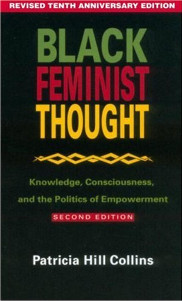Gender studies is an interdisciplinary academic field devoted to analysing gender identity and gendered representation. It includes women's studies, men's studies and queer studies. Its rise to prominence, especially in Western universities after 1990, has been noted as a success of deconstructionism. Sometimes, gender studies is offered together with study of sexuality. These disciplines study gender and sexuality in the fields of literature, linguistics, human geography, history, political science, archaeology, economics, sociology, psychology, anthropology, cinema, musicology, media studies, human development, law, public health and medicine. It also analyzes how race, ethnicity, location, class, nationality, and disability intersect with the categories of gender and sexuality.

Gloria Jean Watkins, better known by her pen name bell hooks, is an American author, professor, feminist, and social activist. The name "bell hooks" is borrowed from her maternal great-grandmother, Bell Blair Hooks.

Masculinity is a set of attributes, behaviors, and roles associated with men and boys. Although masculinity is socially constructed, research indicates that some behaviors considered masculine are biologically influenced. To what extent masculinity is biologically or socially influenced is subject to debate. It is distinct from the definition of the biological male sex, as both males and females can exhibit masculine traits.
Men's studies is an interdisciplinary academic field devoted to topics concerning men, masculinity, gender, culture, politics and sexuality. It academically examines what it means to be a man in contemporary society.
Standpoint feminism is a theory that feminist social science should be practiced from the standpoint of women or particular groups of women, as some scholars say that they are better equipped to understand some aspects of the world. A feminist or women's standpoint epistemology proposes to make women's experiences the point of departure, in addition to, and sometimes instead of men's.
The mythopoetic men's movement was a body of self-help activities and therapeutic workshops and retreats for men undertaken by various organizations and authors in the United States from the early 1980s through the 1990s. The term mythopoetic was coined by professor Shepherd Bliss in preference to the term "New Age men's movement". Mythopoets adopted a general style of psychological self-help inspired by the work of Robert Bly, Robert A. Johnson, Joseph Campbell, and other Jungian authors. The group activities used in the movement were largely influenced by ideas derived from Jungian psychology, e.g., Jungian archetypes, from which the use of myths and fairy tales taken from various cultures served as ways to interpret challenges facing men in society.

Raewyn Connell, usually cited as R. W. Connell, is an Australian sociologist. She gained prominence as an intellectual of the Australian New Left. She was appointed University Professor at the University of Sydney in 2004, and retired from her University Chair on July, 2014. She has been Professor Emerita at the University of Sydney since her retirement. She is known for the concept of hegemonic masculinity and her book, Southern Theory.
In gender studies, hegemonic masculinity is part of R. W. Connell's gender order theory, which recognizes multiple masculinities that vary across time, culture and the individual. Hegemonic masculinity is defined as a practice that legitimizes men's dominant position in society and justifies the subordination of the common male population and women, and other marginalized ways of being a man. Conceptually, hegemonic masculinity proposes to explain how and why men maintain dominant social roles over women, and other gender identities, which are perceived as "feminine" in a given society.
Feminism is a broad term given to works of those scholars who have sought to bring gender concerns into the academic study of international politics and who have used feminist theory and sometimes queer theory to better understand global politics and international relations.
Feminist psychology is a form of psychology centered on social structures and gender. Feminist psychology critiques historical psychological research as done from a male perspective with the view that males are the norm. Feminist psychology is oriented on the values and principles of feminism.
Feminist ethics is an approach to ethics that builds on the belief that traditionally ethical theorizing has undervalued and/or underappreciated women's moral experience, which is largely male-dominated, and it therefore chooses to reimagine ethics through a holistic feminist approach to transform it.

Feminist security studies is a subdiscipline of security studies that draws attention to gendered dimensions of security.
Sexism in academia refers to the discrimination and subordination of a particular sex in academic institutions, particularly universities, due to the ideologies, practices, and reinforcements that privilege one sex over another. Sexism in academia is not limited to but primarily affects women who are denied the professional achievements awarded to men in their respective fields such as positions, tenure and awards. Sexism in academia encompasses institutionalized and cultural sexist ideologies; it is not limited to the admission process and the under-representation of women in the sciences but also includes the lack of women represented in college course materials and the denial of tenure, positions and awards that are generally accorded to men.
Feminist pedagogy is a pedagogical framework grounded in feminist theory. It embraces a set of epistemological theories, teaching strategies, approaches to content, classroom practices, and teacher-student relationships. Feminist pedagogy, along with other kinds of progressive and critical pedagogy, considers knowledge to be socially constructed.

Black Feminist Thought: Knowledge, Consciousness and the Politics of Empowerment is a 1990 book by Patricia Hill Collins.
Hip Hop Feminism is a sub-set of black feminism that centers intersectional subject positions involving race and gender in a way that acknowledges the contradictions in being a black feminist, such as black women's enjoyment in (misogynistic) hip hop music and culture, rather than simply focusing on the victimization of black women in hip hop culture due to interlocking systems of oppressions involving race, class, and gender. Hip hop feminism was coined by Joan Morgan in her book When Chickenheads Come Home to Roost: A Hip Hop Feminist Breaks it Down for black women who grew up in the post-Civil Rights Movement and feminist movement era of the 1960s and 1970s. Morgan explains that a hip hop feminist is a self-defined name for black feminists that acknowledges black women's lived experiences as they identify with and enjoy hip hop culture along with supporting feminist issues and agendas where black women are marginalized by the mainstream feminist movement because of their race or the black antiracist movements due to their gender.
Feminist art criticism emerged in the 1970s from the wider feminist movement as the critical examination of both visual representations of women in art and art produced by women. It continues to be a major field of art criticism.
In feminist theory, heteropatriarchy or cisheteropatriarchy, is a socio-political system where (primarily) cisgender males and heterosexuals have authority over cisgender females and over other sexual orientations and gender identities. It is a term that emphasizes that discrimination of women and LGBTQ people has the same sexist social principle.

Professor Catharine Lumby is an Australian academic, author and journalist, currently Professor of Media in the Department of Media, Music, Communication and Cultural Studies at Macquarie University.

The grievance studies affair, also referred to as the "Sokal Squared" scandal, was the project of a team of three authors—Peter Boghossian, James A. Lindsay, and Helen Pluckrose—to highlight what they saw as poor scholarship and eroding criteria in several academic fields. Taking place over 2017 and 2018, their project entailed submitting bogus papers to academic journals in cultural, queer, race, gender, fat, and sexuality studies to determine if they would pass through peer review and be accepted for publication. Several of these papers were subsequently published, which the authors cited in support of their contention.






